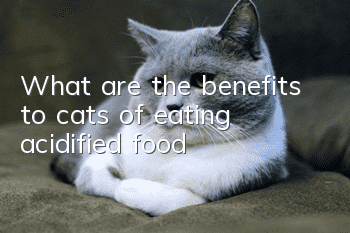What are the benefits to cats of eating acidified food?

Many parents are very cautious about their cats’ diet, hoping to improve the quality through daily feeding, maintenance, and diet to ensure the healthy growth of cats. Everyone knows that most cat foods are acidified foods. Many owners don’t understand why cats need to eat acidified food. Are there any special benefits? The editor will introduce it to you one by one below.
1. The benefits of acidified food to cats
The commercial foods for adult cats currently on the market are basically acidified foods. The so-called acidified food means that cats excrete acidic urine after feeding it, that is, the urine pH value is 6-6.5. Clinically, it has been found that adult cats, especially those between 3 and 10 years old, are most likely to develop magnesium ammonium phosphate (struvite) urinary stones, which account for more than 90% of cat urinary stones. Eating acidified foods to maintain urine pH 6-6.5 can effectively prevent the development of magnesium ammonium phosphate urinary stones. Acidified foods are foods that use large amounts of animal protein, plus phosphoric acid and ammonium chloride. Animal protein is rich in sulfur reactive acids, such as methionine, etc. These reactive acids can produce sulfuric acid in the cat's body and are then excreted in the urine.
Overly acidified cat food with a pH value below 6 can cause excessive loss of potassium and calcium from the urine, which is detrimental to the health of cats. Young cats mainly feed on milk, which can produce acidic urine in their bodies. If young cats eat acidified food, it will hinder the healthy growth and development of their bones. This is why young cats cannot feed adult cats commercial food. One of the reasons. Pregnant and lactating female cats should not be fed acidified food because acidified food can hinder the healthy development of the fetus or kittens. Elderly cats over ten years old are prone to form oxalate urinary stones. Oxalate urinary stones are formed in an acidic urine environment. Feeding acidified food will increase the risk of urinary stones in older cats. Therefore, elderly cats should not be fed acidified food. Abroad, in recent years, an increase in oxalate urinary stones has been found in non-elderly cats, which may be related to the popularization of acidified foods in adult cats, especially those foods that make the pH value of urine lower than 6.
2. Cats cannot eat food
The following is an introduction to foods that cats must not eat:
1. Seafood: Feeding seafood can easily induce allergies.
2. Raw eggs: often contain a large number of bacteria, which affects the cat’s resistance.
3. Dessert: It can cause obesity in cats and cause a series of diseases.
4. Onions: Onions are beneficial to the human body, but cats cannot tolerate them and may even develop hemolytic anemia.
5. Bones: Cats’ esophagus is relatively fragile and they are not good at chewing food. If bones are eaten, it can easily damage the esophagus.
6. Grapes: This is a fruit that cats must not eat. It will have serious adverse effects on the cat’s kidneys.
3. In addition, the cat is eating the followingBe careful when eating
1. Fish and meat: Fish and meat are rich in protein, but raw fish and meat must not be fed to cats. Because raw fish and meat are likely to be contaminated or contain parasites, which can make cats infected and sick. Therefore, fish and raw meat should be cooked first.
2. Milk: Milk contains many nutrients and can also provide the water and calories needed by the cat's body, but it is still not enough to provide all the nutrients needed for the growth and development of the kitten, so the feeding of the kitten cannot only rely on milk. . Adult cats cannot drink more milk because they cannot digest the lactose in it.
3. Liver and carrots: Long-term consumption of liver will cause calcium and phosphorus imbalance in cats, so when using liver, pay attention to calcium supplementation. In addition, liver can provide cats with abundant vitamin A, and the same goes for carrots. Therefore, it is best not to eat liver and carrots at the same time, otherwise it will cause vitamin A accumulation poisoning in cats.
4. High-fat foods: Cats should not eat too many high-fat foods, such as fatty meat, in their diet to avoid vitamin E deficiency, obesity and cardiovascular disease.
5. Dog food: Many people think that the food of cats and dogs is the same, but they do not know that cats and dogs have very different nutritional needs. Dog food cannot provide all the nutrients cats need. Long-term consumption can lead to cat nutritional deficiencies. bad.
6. Cod liver oil: Cod liver oil is a good thing, it can supplement vitamins A and D, but for cats, it will cause excessive amounts of vitamins A and D, affecting bone health.
Healthy and reasonable food can help cats grow up healthily and live longer. I believe that many parents hope that cats can accompany them for a longer time. Therefore, in daily life, we must not only create a good environment for cats, but also Cats’ diet should be arranged reasonably.
- How many pounds does a cat need to be considered obese?
- The cat food vomited out by the cat is still intact
- Can I use saline to clean my cat’s ears?
- There are hard little bumps like scabs on the cat’s head and neck
- What items do novice cat owners need to prepare?
- Can blue cat diarrhea heal on its own?
- The first night of neutering a male cat is a dangerous period
- Train your cat to walk with you and teach you how to walk your cat!
- What causes cats to sneeze?
- Training your cat’s social behavior when it’s young



